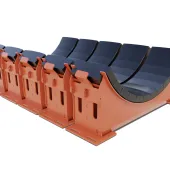ScottishPower sludge-to-fuel plant runs smoothly after investment in lining systems
The Daldowie Fuel Plant, commissioned in 2002 and operated by SMW Ltd who are a subsidiary of ScottishPower, is one of the largest sludge-drying centres in Europe. It processes sludge from hundreds of wastewater treatment plants in the west of Scotland into processed sludge pellets (PSP) which are suitable for use as a dry fuel in a range of applications from power stations to cement columns.
The dry, low-odour pellets produced at Daldowie are a type of biomass - biological material that is deemed to be a sustainable form of fuel. Every year SMW Ltd turns more than 2 million cubic metres of liquid sludge into more than 45,000 tonnes of PSP, which is burned to produce electricity or heat. The nature of the input material collection process means that it contains a percentage of grit that makes both the sludge and the dry pellets particularly abrasive.
The abrasive nature of the process material and the high volumes being transported around the plant mean that wear erosion is a challenge faced on many areas of the plant. Some areas of the process such as the pipes used to pneumatically transport the dry product are particularly vulnerable and were fitted with Kingfisher ceramic-lined pipes and bends as original equipment when the plant was first installed 10 years ago.
According to Iain Russell, process and projects manager at SMW Daldowie, the Kingfisher wear-protected 6in diameter pipework on site is showing few, if any, signs of wear, hence the reason for asking Kingfisher to look at some other problem areas of the plant.
A regular inspection is made of the process equipment - with external visual inspections taking place during every daily shift and a more detailed internal inspection made during a two-week shutdown period, which is scheduled every six months for each section of the process plant.
Having taken the opportunity to inspect a pipe bend transporting dry pellets during routine maintenance it was noted that the ceramic lining was barely showing signs of wear, even though it had been in use for 10 years.
Although having used other ceramic bead coatings on site before, Kingfisher have lined the inner shell of a ploughshare mixer that has a metal drum (approx. 1m diameter) and a central shaft with mixing blades (termed ploughs).
The work was completed during 2011 and has just been inspected again in detail; SMW are pleased to report that the surfaces look like new. The estimated minimum lifespan of five to six years now sounds like a conservative estimate.
Iain Russell commented: ‘The work was done during a routine shutdown period and so there was no interruption to our operations schedule. The high standard of supporting risk-assessment statements and method statements provided by the Kingfisher team also gave us tremendous confidence with them as a supplier and meant we were more than comfortable with them working on our site. The team was obviously well trained and very experienced which added to the professionalism of the job as a whole.
‘It is testament to Kingfisher's products, services, flexibility and willingness to listen that marks them out as a supplier who we have formed a mutually beneficial partnership with.’
John Connolly, managing director of Kingfisher Industrial, commented: ‘Dry pellet production is coming under increasing pressure from less energy-intensive processes such as gas from anaerobic digestion; although the plants tend to be smaller and the yields lower as a result. It is essential that the Daldowie PSP plant operates at its maximum efficiency and maintains uptime, hence the use of carefully selected and matched wear-protection systems, installed by a professional company are essential to the long-term viability of the plant. It is in these continuous applications where good wear protection sees its maximum ROI.’









